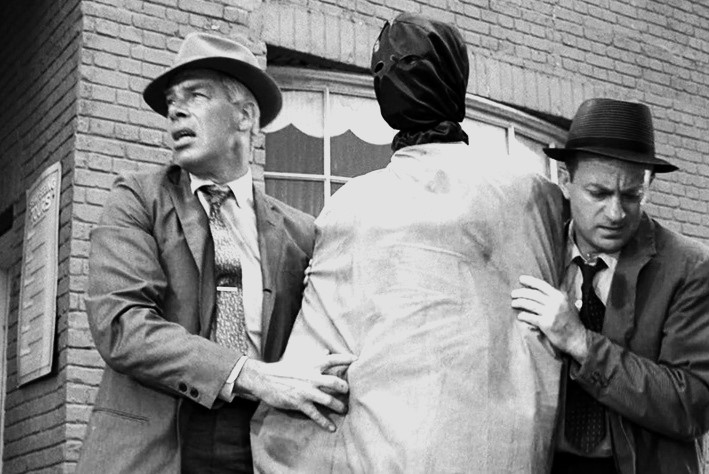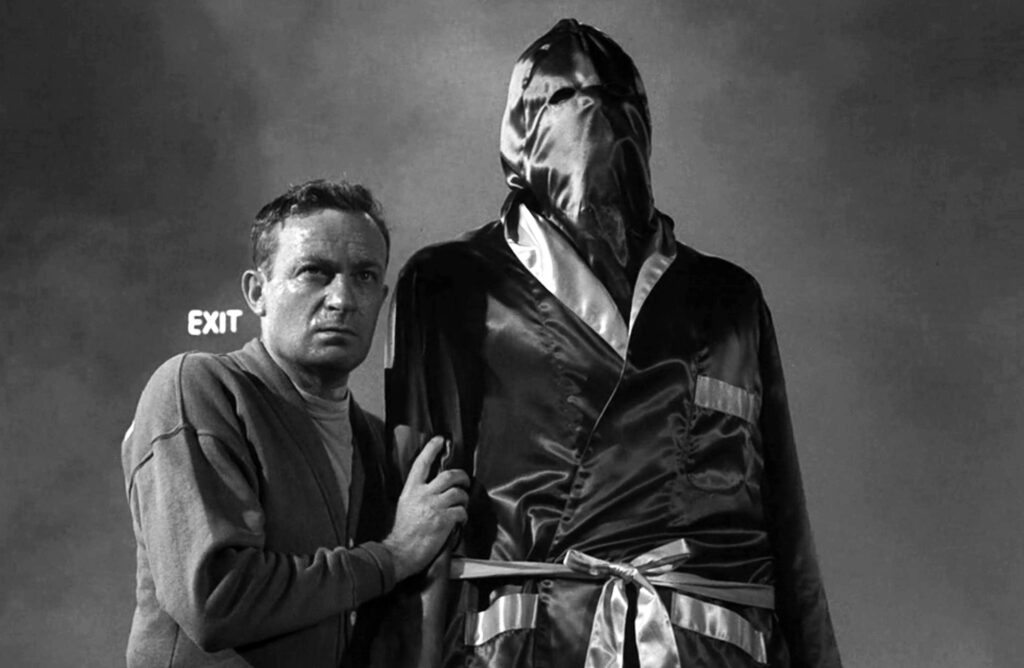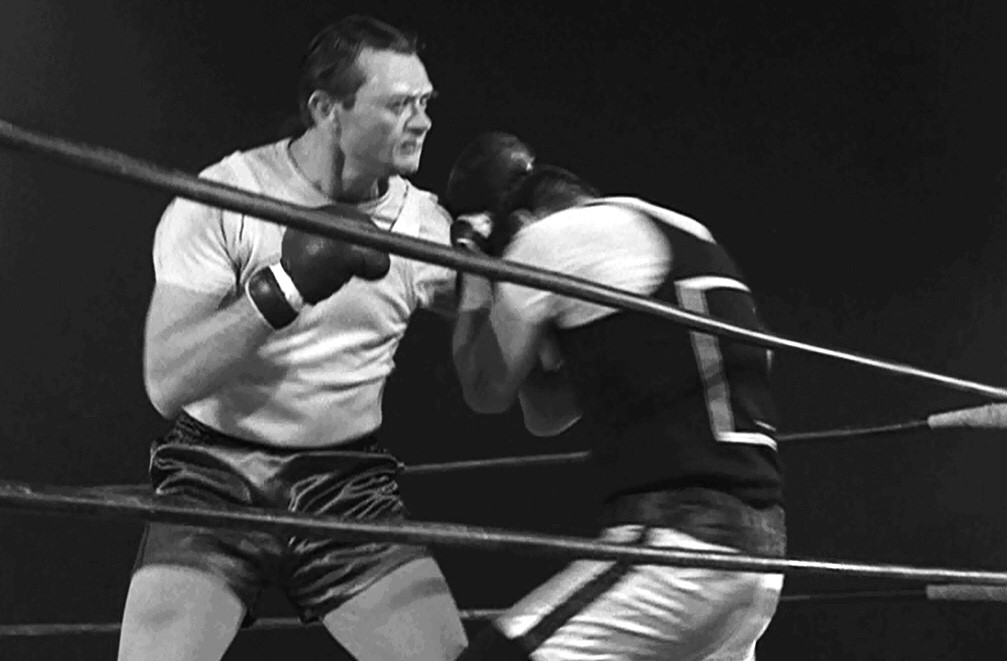[ad_1]
The discord and violence, the blood, brutality, and mind trauma, it has all come to a head. Was it the delusion of a “civilized society,” spurred by human naivete that lastly stripped boxing of its final veneer of respectability? Did a single incident function the ultimate straw? Or possibly it was simply the passing of an age when individuals had much less entry to visceral spectacles to fulfill their dying drive—in spite of everything, tv had but to be invented when the battle recreation was nonetheless acceptable, nonetheless mainstream. Six years in the past, all the pieces modified: boxing was turned over to robots, and no matter sparked its closing eradication is just not for the viewer to know.
The 1963 Twilight Zone episode Metal, written by fantasy, horror, and science fiction writer Richard Matheson (finest recognized for his 1954 novel I Am Legend) commences as three figures exit a bus in Maynard, Kansas. The yr is 1974, and one thing’s not proper about one among them: a broad-shouldered Imhotep in a straight-jacket shroud and black executioner’s hood which the 2 different two males push alongside on wheels, one among which has simply come off.
With practiced persistence, the 2 males set to work on the mechanized descendent of the three-thousand-year-old Hellenistic Pugilist at Relaxation—ashy stays of a flame that when blazed guts and glory. The machine’s supervisor and one-time boxer, Metal (Lee Marvin), is aware of his defective android wants a tune-up, however cash’s tight. Nonetheless, “Battling Maxo” will need to have at the least one extra battle to present, or at the least sufficient to cowl the repairs which might put it again within the recreation. Pole, the mechanic and one-time coach (the latter job now rendered out of date), isn’t so certain. Maxo’s an vintage—a hopelessly outdated B-2 mannequin for which alternative elements are not made. Though Metal is definite that tonight’s purse is a step towards getting his boy again within the recreation, that gained’t assist tonight when Maxo fights a brand-new B-7.
Lower to a close-by desk the place Rod Serling sits behind a cup of espresso, whisps of cigarette smoke rising out of the body as he speaks to the viewer. “No legislation might be handed which can abolish cruelty or determined want—nor, for that matter, blind animal braveness.” Of whose braveness is he talking? Man or machine? You recognize the Zone you’re in. You noticed the signpost up forward.
This new breed of fighter is the one indication that the story takes place sooner or later, the place mannequin numbers have changed weight lessons. In a locker room like another, the dead-eyed Maxo is revealed, his physique ravaged with scars and bruises that don’t heal and an electrical system that’s on the fritz. Perhaps the answer lies tangled amid the controls and wires behind that steel door on its again, however when one other spring breaks unfastened, panic units in.
It’s not too late to again out, Pole reminds Metal. There’s a man in Philly promoting a B-5 low-cost. However Metal has a unique plan. The B-2s minimize, bruise, and bleed like actual people, and Metal was an excellent fighter in his day. He wants this payday, and what’s extra essential than cash and delight—if not essentially in that order? All Metal must do is to idiot the promoter (who has by no means seen, not to mention ever heard of “Battlin’ Maxo”), into pondering he’s the robotic.
Pole tells Metal that the B-7 will kill him. Even a midway first rate B-4 might, and Pole’s not the one doubter: with out an natural cell in its physique, Maxo’s vacant eyes appear to stare instantly at Metal as they challenge and portend his imminent defeat.
Amid cries from the gang of ‘Scrap iron!’ and ‘Pile of junk!’, Pole wheels Metal into the ring on Maxo’s dolly. Within the reverse nook sits the B-7, its hard-wired circuitry recalling Jeff Goldblum’s existential question from 1986’s The Fly: “Have you ever ever heard of insect politics? Neither have I. Bugs don’t have politics. … No compassion, no compromise.” In its lack of natural life, the B-7 is even much less compromising or compassionate—one thing Metal will discover out quickly sufficient.
Following an extended, hopeless minute, Metal seems to be as much as see the untouched M-7 elevate its rubber arm in victory. Refusing to shell out a full 5 Cs for the pathetic one-rounder, the promoter provides the lads half, sufficient to get them again to Philly with slightly below 200 left over. Battered to a stupor, Metal begins devising tips on how to allocate it: “Get some oil in him… a brand new lens plate… all we want’s just a little overhaul.” Maxo’s mounted visage is nearly human in its doubt and pity for the supervisor, as if the machine itself is aware of it’s washed up. However by no means thoughts. Metal will nonetheless present ’em what an excellent B-2 can do.
Serling’s introductory feedback on the human want for vicarious cruelty are extra relevant to the gang than the fighters. Demented with sadistic pleasure on the demise of the would-be B-2, the so-called followers obtained what they got here for. Within the twelve years since robots changed people, the bloodlust hasn’t diminished, and for tonight, the dying intuition is sated. However only for tonight—in spite of everything, how lengthy earlier than the upcoming obsolescence of the B-7 relegates it to the scrap heap?
Metal’s ravaged physique punctuates Serling’s feedback on “determined want” and “blind animal braveness” that by no means go away, and the place even in essentially the most distant of futures, people cling to dying extra dearly than to life—simply so long as the previous is just not their very own. –David Curcio
[ad_2]
Source link























